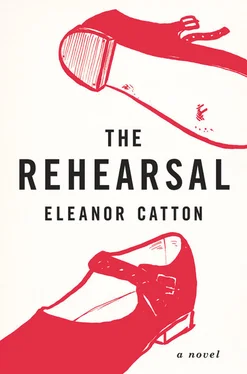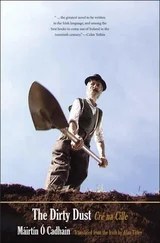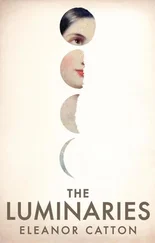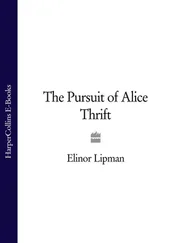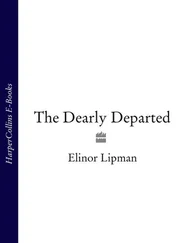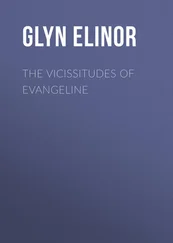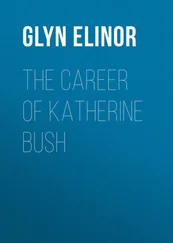“Oh, Mrs. De Gregorio. I’m her music teacher,” the sax teacher says. She returns her mug to the table and folds her hands.
“But then what do I do?” Mrs. De Gregorio asks with a kind of rising panic. “What options have I left?”
“You could ask your daughter,” the saxophone teacher says. “You could sit down and actually talk to her. But you always run the risk that she might lie.”
Monday
“What did you imagine while you were watching?” the saxophone teacher asks when Julia arrives for her lesson on Monday afternoon. “At the concert.”
“I liked the second half better than the first half,” Julia begins, but the saxophone teacher waves her arm impatiently and says, “No, I meant what did you think about while you were watching? What sorts of things were you thinking about?”
Julia looks at her curiously, as if this might be a test. “Why?” she asks.
“It’s a game I used to play with an old friend of mine,” the saxophone teacher says. “We had a joke that the better the performance, the more catalytic the effect. A poor performance might only make you think about what you had for dinner or what you were going to wear when you woke up the next day. But a great performance would make you imagine things you would never have been brave enough to imagine before.”
She is speaking eagerly, like a child. Julia unclips her saxophone case and says, “I was just thinking about the music.”
“Yes, but around that. When your mind drifted. What did you imagine?”
Julia slips her reed out of its gated plastic sheath and holds it for a second. “I imagined what was going to happen,” she said, “when I dropped Isolde home.”
The lights change. The overhead lights and the bright overcast light from the window are doused; a template falls into place in front of a solitary floodlight and the attachment begins to rotate, so that the yellow light is thinly striped and ever changing, playing over the pair of them like passing streetlights striping the dashboard of a moving car. Julia sits down. The streetlights come and go, streaking over her knees and curving away over her shoulder to disappear, and she is dark for a moment before another streak of light rises up to replace the first, and then another, and another, all yellow and forward bending.
“I imagined,” Julia says, “that on the way home we would talk about the concert a bit, and what we thought of it, and the teachers that we had in common at school, and we’d keep coming back to you , to talk about you, because you are the only real thread of connection between us. We’d talk about you for a while back and forth, only we wouldn’t be quite honest, because the most important thing would be to create an attractive impression of ourselves, and what we truly thought didn’t really matter. We’d say whatever things would put us in the best light. We’d lie. All the way home we’d lie to each other, back and forth.”
The saxophone teacher is unmoving. She looks Julia up and down with her eyes only. Her face is like a mask.
“And then I imagined,” Julia says, “that after I killed the engine we would sit there for a moment, not looking at each other, just looking up through the darkness at Isolde’s unlit house. My key ring would still be swinging from the ignition, and we would listen to the sound of the wind whipping the leaves. My mouth would be dry.”
The rotating template has stilled and Julia’s knees are in a square of light which falls through the car window and across her lap. Her face is in shadow. She is sitting stiffly, one leg forward-stretched and cocked at an angle, as if on the brake pedal. Her saxophone is lying on the couch beside her, and she is holding it casually with her left hand, lifting the upper end slightly off the couch, so it looks like her hand is curled casually around the handbrake, her knuckles in the plastic shallow beneath the handle and her wrist loosely arched. With her other hand she plucks at her sternum, testing the tension of an invisible seat belt strap, lifting it carelessly and letting it slap back against her chest.
“And I’d go, You know what everybody says about me. At school and everything. It isn’t true.”
Julia wets her lips with her tongue. She isn’t looking at Isolde: she’s looking out the window, peering into the dark silver of the wing-mirror, one hand still plucking at her strap.
“Isolde goes, I know. She says it really quickly and then she says it again. I know. She’s not looking at me, she’s looking forward, up at the house, and her finger is at her throat, twisting her necklace around and around, cutting all the blood from her fingertip. The end of it has gone gray.” Julia looks back at Isolde again, quickly, and tightens her grip around the handbrake. “And then I go, I was just worried that you might think I was going to come on to you, or jump you when you least expected it or something. I was worried you might think that.”
She reverts to gazing into the wing-mirror, turning her face away.
“Isolde goes, I don’t think that. And I go, Good. And then we sit for a moment, looking up at Isolde’s unlit house and listen for each other’s breath, and then I go, That’s all. That’s all I wanted to say.”
The lights come up a little, just enough to include the saxophone teacher and bring her into the scene. She shifts and crosses her legs. She looks uncomfortable.
“What is it that everyone says about you at school?” she asks reluctantly. Sometimes Julia makes her feel cornered, and she is feeling cornered now.
“Everyone thinks I like girls,” Julia says.
“I see,” the saxophone teacher says. The lights dip back down again, receding back to the single streetlamp casting its square pool of light across Julia’s lap. The saxophone teacher disappears again into the dark.
“We parked the car,” Julia says, “and sat there for a while, and whatever we were talking about sort of trickled away like water until there was nothing left and we just sat and waited for something to happen. My mouth was dry. And then Isolde goes, Do you mind waiting here in the car for a while? My mum thinks Victoria came to the concert with me, and we have to walk in at the same time in case she’s still up.
“And even while she was saying it a car pulled up and stopped a few houses in front of where we were, so both of us were lit red for a moment in the glare of the taillights, and then the lights went off but nobody got out. We watched but the car just sat there. And Isolde goes, She doesn’t know we’re here. She hasn’t seen us. Isolde’s watching the car with a hard tight sort of expression and I don’t want to say anything in case it’s the wrong thing, and then she says, We had it all arranged. Mum dropped both of us off at the concert, and I went in to meet you guys and Victoria went off to meet him. It’s the only way she can still see him. She’s grounded most nights, and none of her friends will cover for her now. I don’t mind.”
The saxophone teacher leans forward in the dark. She is frowning.
“And then Isolde goes, I’d better go. If we sit here for much longer it’ll be weird. I have to go.”
Julia smoothes her knees and tugs again at her seat belt, nodding.
“But she doesn’t go. She stays in the car for a moment longer, and through the back window of the car in front we see Victoria lean over and put her head on Mr. Saladin’s shoulder. It looks awkward, stretched across the gearshift with all this space in between them, and he reaches his arm up and strokes her head. He’s saying something but we can only see their silhouettes. It’s like a shadow-play, and all of a sudden my heart is hammering and I look at Isolde and she looks at me really quickly, but then again, and she says, Please don’t tell anyone, and I say I won’t.”
Читать дальше
